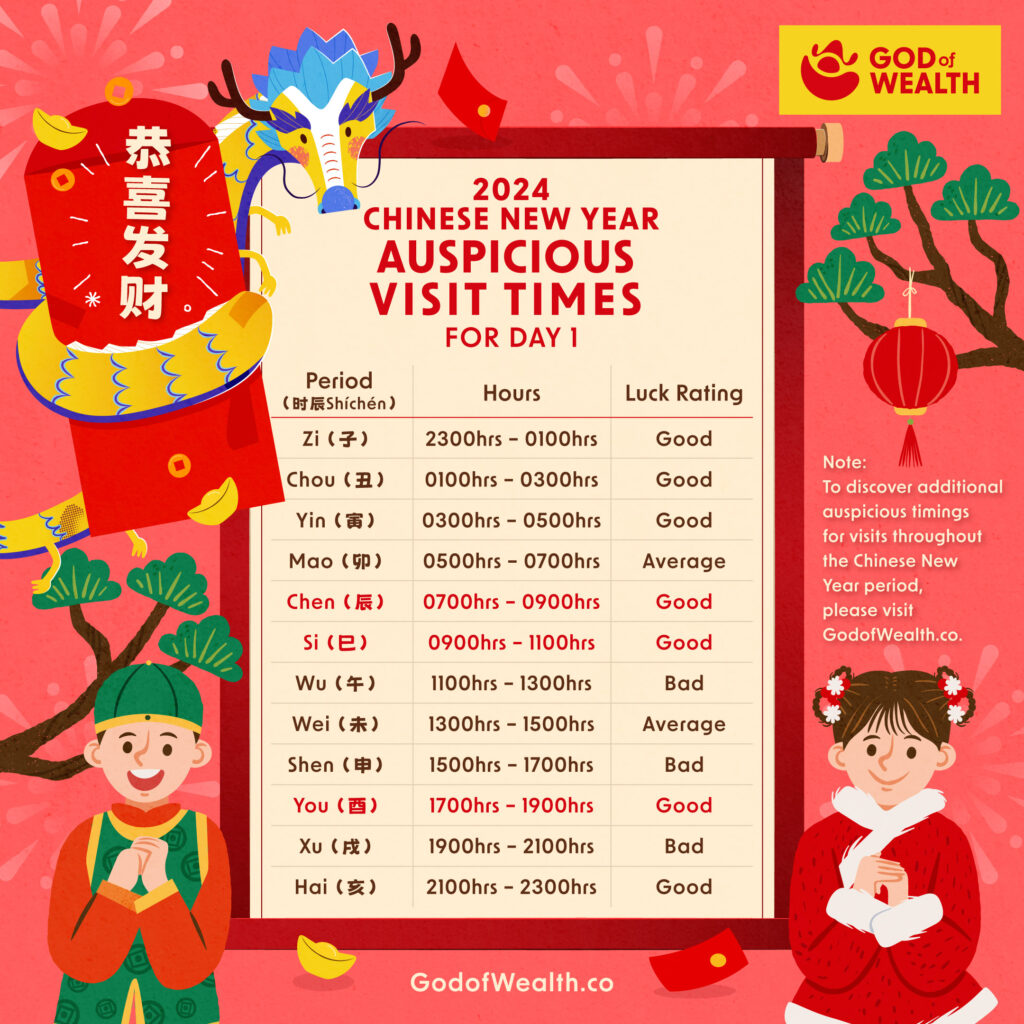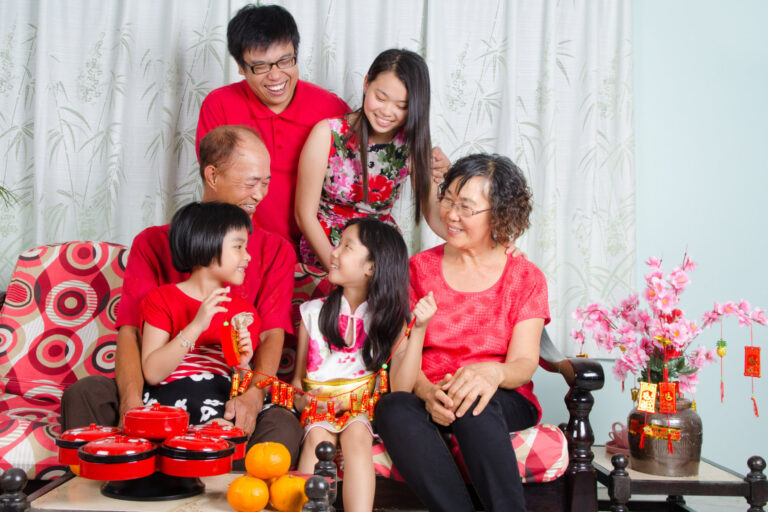As the vibrant festivities of the Lunar New Year unfold, the time-honored tradition of visiting family and friends comes to the forefront.
The practice, known as 拜年 (Bài Nián), is not only about strengthening ties but also aligning one’s actions with the auspicious cosmic energies believed to set a positive course for the year ahead.
With the arrival of the 2024 Chinese New Year, also heralded as the Year of the Dragon, understanding the auspicious dates for Chinese New Year visiting becomes paramount for tapping into the year’s potential for prosperity and success.
Table of Contents
The Significance of Chinese New Year Visiting Timing
In Chinese culture, timing is everything. The ancient lunar calendar, with its roots deep in the agrarian society of historical China, dictates the ebb and flow of energies on specific days and even hours.
The belief is that performing actions, such as visiting relatives (拜年) during auspicious times, can enhance one’s luck, health, and wealth throughout the year.
Harmonizing with Auspicious Hours
The practice of selecting auspicious hours is based on the 12 Chinese zodiac hours, each associated with a different animal sign and corresponding period of the day. This system, deeply integrated into the Chinese understanding of time, allows for the precise selection of the most favorable moments for beginning one’s Chinese New Year visiting.
For your convenience and cultural enrichment, here is a table that lists the auspicious and inauspicious times for the first day of the Lunar New Year in 2024:
| Period (时辰 Shíchén) | Hours | Luck Rating |
|---|---|---|
| Zi (子) | 2300hrs – 0100hrs | Good |
| Chou (丑) | 0100hrs – 0300hrs | Good |
| Yin (寅) | 0300hrs – 0500hrs | Good |
| Mao (卯) | 0500hrs – 0700hrs | Average |
| Chen (辰) | 0700hrs – 0900hrs | Good |
| Si (巳) | 0900hrs – 1100hrs | Good |
| Wu (午) | 1100hrs – 1300hrs | Bad |
| Wei (未) | 1300hrs – 1500hrs | Average |
| Shen (申) | 1500hrs – 1700hrs | Bad |
| You (酉) | 1700hrs – 1900hrs | Good |
| Xu (戌) | 1900hrs – 2100hrs | Bad |
| Hai (亥) | 2100hrs – 2300hrs | Good |
For Chinese New Year 2024, the most auspicious visit times on the first day are the Chen period (辰时, 7-9am), Si period (巳时, 9-11am), and You period (酉时, 5-7pm).

Here are other auspicious times for Chinese New Year visiting in 2024.
| Lunar Date | Gregorian Date | Auspicious Timing | Not Suitable For Zodiac |
|---|---|---|---|
| 初二 (2nd Day) | 11 February 2024, Sunday | 07:00-08:59 11:00-12:59 13:00-14:59 19:00-20:59 21:00-22:59 | Pig |
| 初三 (3rd Day) (Not recommended for visiting) | 12 February 2024, Monday | 05:00-06:59 11:00-12:59 15:00-16:59 17:00-18:59 | Rat |
| 初四 (4th Day) | 13 February 2024, Tuesday | 05:00-06:59 09:00-10:59 15:00-16:59 19:00-20:59 | Ox |
| 初五 (5th Day) | 14 February 2024, Wednesday | 07:00-08:59 09:00-10:59 13:00-14:59 19:00-20:59 | Tiger |
| 初六 (6th Day) | 15 February 2024, Thursday | 05:00-06:59 11:00-12:59 13:00-14:59 17:00-18:59 | Rabbit |
| 初七 (7th day) | 16 February 2024, Friday | 07:00-08:59 09:00-10:59 15:00-16:59 17:00-18:59 21:00-22:59 | Dragon |
| 初八 (8th day) | 17 February 2024, Saturday | 07:00-08:59 11:00-12:59 13:00-14:59 19:00-20:59 21:00-22:59 | Snake |
| 初九 (9th day) | 18 February 2024, Sunday | 05:00-06:59 15:00-16:59 17:00-18:59 | Horse |
| 初十 (10th day) | 19 February 2024, Monday | 09:00-10:59 15:00-16:59 19:00-20:59 21:00-22:59 | Goat |
| 初十一 (11th day) | 20 February 2024, Tuesday | 07:00-08:59 09:00-10:59 13:00-14:59 19:00-20:59 | Monkey |
| 初九十二 (12th day) | 21 February 2024, Wednesday | 05:00-06:59 11:00-12:59 13:00-14:59 | Rooster |
| 初十三 (13th day) | 22 February 2024, Thursday | 07:00-08:59 09:00-10:59 15:00-16:59 17:00-18:59 21:00-22:59 | Dog |
| 初十四 (14th day) | 23 February 2024, Friday | 07:00-08:59 11:00-12:59 13:00-14:59 19:00-20:59 | Pig |
| 初十五 (15th day) | 24 February 2024, Saturday | 05:00-06:59 11:00-12:59 15:00-16:59 17:00-18:59 | Rat |
Which Days Are for Chinese New Year Visiting
Generally speaking, the first to the fifth days of the first lunar month are suitable for Chinese New Year visiting. However, it’s a traditional Chinese custom to avoid visiting on the third day of the new year. This day, known as “Chìkǒu” (赤口), is considered inauspicious for such visits.
- Visiting Family Members: On the morning of the first day, younger family members should first greet their elders, wishing them health, longevity, and all the best. After receiving the greetings, elders give the younger family members the “lucky money 压岁钱” they have prepared in advance.
- Visiting Relatives and Friends: It’s customary to visit the parents of one’s spouse on the first or second day, bringing gifts with you. Upon entering their home, you should first pay respects to ancestral portraits or tablets with three deep bows, and then kneel and greet the elders in turn. Visitors may stay for meals, games, and conversations.
- Formal Visits: For formal visits, such as greeting friends, a simple bow with hands clasped is sufficient if the host is of the same generation. If they are older, it’s appropriate to kneel and bow. The host should assist the visitor in rising while politely urging them to dispense with formalities. Such visits are usually brief, with just a few courteous exchanges before departure. After receiving visitors, the host should choose a later date for a return visit.
Dos and Don’ts During Chinese New Year Visiting
When meeting during these visits, it’s crucial to start with well wishes phrases. Cantonese and Hong Kong people usually begin with “Gōngxǐ fācái” (恭喜发财), meaning “Wishing you wealth and prosperity,” followed by other blessings.
Married elders distribute ‘lìshì’ (利是), also known as red envelopes (红包), to the younger family members. Additionally, hosts prepare traditional snack boxes to welcome their guests during these visits.
Do:
- Have Breakfast Together as a Family: Start the first day of the New Year with a family breakfast. This signifies unity and the gathering of good fortune for all family members. It’s a way to begin the year on a note of familial harmony, which is considered a pillar of good luck.
- Incorporate Auspicious Colors Into Your Outfit: Dressing in red, orange, or blue is believed to attract good luck and happiness. Red symbolizes joy and good fortune, orange represents change and adaptability, and blue signifies healing and trust. Wearing these colors can enhance the festive spirit and is said to bring favorable energy to the wearer.
- Exchange Two Mandarin Oranges: When visiting during Chinese New Year, it is traditional to exchange a pair of mandarin oranges with your host. This act symbolizes the exchange of good wishes and fortune. Oranges are chosen for their golden color, which is associated with wealth and luck.
- Be Generous with Your Chinese New Year Greetings and Wishes: As you meet family and friends, offer heartfelt and bountiful wishes for the New Year. Generosity in sharing good fortune through words is believed to amplify positive energy and bring about mutual prosperity.
- Participate in Group Activities and Games: Enjoy traditional table games such as Mahjong, Fish-Prawn-Crab, and Emperor’s Sticks during Chinese New Year visiting. These games, often featuring light gambling elements, are for bonding and fun, not competition. Modern celebrations also include card and board games, leading to festive group meals that enhance the celebratory atmosphere.
Don’t:
- Avoid Negative Topics: Conversations during visits should be positive and uplifting. Refrain from discussing topics like death, illness, or misfortune as they are considered to bring bad luck. The focus should be on sharing good news and well wishes for the year ahead.
- Do Not Gift Sharp Objects: Giving gifts such as knives or scissors is taboo as it is believed to sever relationships. Choose gifts that symbolize growth, health, and prosperity instead, like fruits or tea.
- Steer Clear of Monochrome Outfits: Specifically, avoid wearing too much white or black as these colors are traditionally associated with mourning. The New Year is a time of celebration, and your attire should reflect the joyous mood of the occasion.
Happy Chinese New Year Visiting
Whether you deeply adhere to these traditions or appreciate them from a cultural perspective, planning your 拜年 visits around the 2024 Chinese New Year visiting auspicious dates can add a layer of meaning and intention to your celebrations.
As you navigate the Year of the Dragon, may these times serve as your guide to a year filled with joy, good health, and prosperity.
Check out auspicious dates during Chinese New Year 2024 for other activities:
- Auspicious Dates for Gambling Luck
- Auspicious Days to Start Work
- Auspicious Dates for Altar Cleaning
- Auspicious Dates for Li Chun 2024
- When to Welcome God of Wealth in 2024
- Auspicious Timing to Exercise During CNY 204
How long does the Chinese New Year visiting period last in 2024?
Chinese New Year visiting typically lasts until the 15th day of the first lunar month, culminating in the Lantern Festival.
What is the significance of wearing new clothes during Chinese New Year visiting in 2024?
Wearing new clothes symbolizes a fresh start and the welcoming of new fortunes in the New Year. It’s a tradition to wear new, often red, clothing for good luck.
Is it appropriate to use electronic red packets for Chinese New Year visiting in 2024?
With the rise of digital payments, electronic red packets have become increasingly popular and are an acceptable modern alternative to traditional red envelopes.
What’s the proper etiquette for receiving red envelopes during Chinese New Year Visits?
When receiving a red envelope, accept it with both hands as a sign of respect, and express gratitude to the giver. It’s polite to open the envelopes privately later.
How can I decorate my home for Chinese New Year Visits in 2024?
Decorate your home with red lanterns, couplets, and symbols of prosperity and good fortune, such as the character 福 (fú) and images of the zodiac animal of the year. Remember to check the auspicious times for spring cleaning and Chinese New Year decorating to enhance the festive spirit and invite good luck into your home.



